
Developer: Jump Over The Age
Publisher: Fellow Traveler
Platform: Switch, PC
Tested on: Switch
In Other Waters – Review
In Other Waters promises a free dive into an expansive section of the seafloor, and while this is true to a certain extent, don’t go in expecting the next Endless Ocean or ABZU. Instead, Jump Over The Age’s ocean exploration game provides a completely different experience altogether. We took the plunge and joined dr. Ellery Vas in her exploration of planet 677Cc.
Story
From the get-go, In Other Waters defines itself as a mostly text-based experience. Although the story isn’t delivered in a traditional way, you’ll be able to piece together what happens through Xenobiologist dr. Ellery Vas’ monologue as she finds herself in a dire situation on planet 677Cc. After arriving on an abandoned base, she finds herself alone in an alien ocean and must now find her way to safety. Well, not exactly alone. Dr. Vas’ diving suit is controlled by a strange AI, and that AI is you, the player. Your task is to assist dr. Vas in navigating this ocean safely. At first, this is a rescue mission, but soon enough, dr. Vas’ eagerness to document the alien lifeforms that inhabit the ocean takes over and you’ll find yourself getting caught up in her descriptions of these fascinating lifeforms. As you make your way through, you’ll discover what happened in the past, how the base was abandoned and what dark secrets lie on the ocean floor….
The writing here is excellent, but quite frankly, it needed to be. Due to some deliberate gameplay choices -more on that below- you’ll never actually get to see the events that happen. However, dr. Vas’ monologue manages to describe the alien ocean in such a way that you’ll have no issues imagining exactly what she’s looking at -although exactly how this looks will probably vary from player to player. It’s no small feat to communicate the amount of information between the AI and dr. Vas in such a way with very limited visual aides, but it works wonderfully. A variety of emotions, feelings of danger and a sense of urgency are also present at times, further emphasizing that games don’t always need visual appeal to drag a player into their world.
Graphics
In Other Waters is played uniquely through interface screens. As you are the AI controlling dr. Vas’ suit, you cannot directly look at the outside world, and as such, there is very little variety in what you actually get to see. Lifeforms are represented as yellow dots on the screen of your radar, and mountain ranges look like jagged lines. The interface looks sleek and modern, and makes sense for the most part. Having relatively simplistic graphics also makes sense given the nature of the game. The downside of this is that the interface is too simplistic at times, and that certain buttons simply blend into the rest of the screen a little too much to be comfortable to navigate. Given that the game actually plays better on a touch screen, it does mean that you are sacrificing visual fidelity even further in exchange for more responsive gameplay.
Sound
Slow, beautiful music and haunting soundscapes further emphasize the atmosphere that In Other Waters is trying to evoke. The music changes alongside what is happening around you, and really ties everything together. The game is best experienced with headphones, in order to emphasize the feeling of being isolated on this alien planet, trapped in a suit as an AI.
Gameplay
Given that In Other Waters is, in essence, a modern variant on classic text adventure games, the appeal is limited. Most of your actions are monologue-driven. As the AI of dr. Vas’ suit, you’ll never actually see the alien ocean. Instead, the entirety of the game is depicted through interface screens that display essential information, such as oxygen and power left, as well as a radar screen that shows a rudimentary top-down view of the ocean floor. Make no mistake: this is definitely not a game that will appeal to everyone, but it doesn’t need to be either.
If anything, In Other Waters is all about forming a symbiotic relationship with dr. Vas. As the player, you might not be able to see what is going around you, but she does, and she will tell you. You are essentially blind, and she is your eyes and ears, whereas she depends on you to ensure her survival. The ocean of planet 677Cc is a beautiful but dangerous place, and you can’t always see what is a threat and what is not, but dr. Vas can. If a yellow dot is rushing towards you on the map, you might feel a sudden surge of panic as you might think it’s an enemy…. Until dr. Vas describes that it is a harmless jellyfish making its way towards you. This blindness is part of the appeal of In Other Waters, as it provides a unique and mesmerizing experience. It’s not an action-packed game though, but a slow burn. Even so, once you get into the game, hours fly by and you’ll find yourself deeply engaged with dr. Vas’ story.
The suit is controlled either through a classic button setup or through the Switch touch screen. We actually preferred using the touch screen, even though it meant playing the game for hours in handheld mode. Using the L-stick to turn the radar wasn’t always as accurate as it should be, but the touch screen controls were a breeze. Figuring out the controls wasn’t always as easy. Available actions are highlighted in the interface, but exactly how to perform certain things, such as taking biological samples is never explained, and it took us a few minutes to figure it out, as the highlighted buttons to do this blended into the rest of the interface and were hard to notice.
Conclusion
With In Other Waters developer Jump Over The Age revives the classic genre of text-based adventure games, albeit in an updated version. The developer made a bold choice by stripping the gameplay experience down to interface screens and very basic interaction with the world. The result is a niche game for a limited audience. However, if you’re in the right mindset to play it, it offers a fantastic experience that will linger with you until long after you have finished it.
In Other Waters - Review,

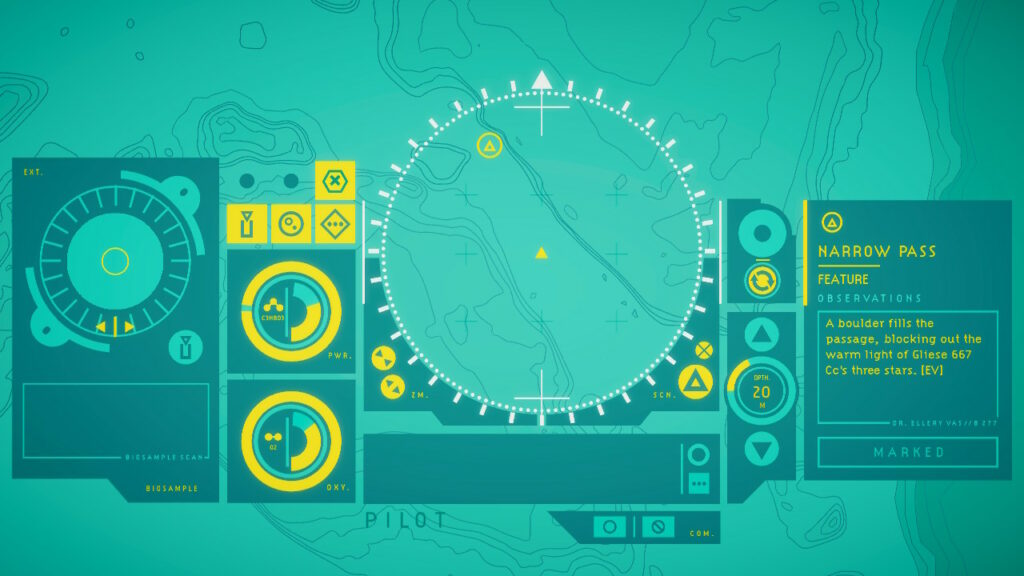
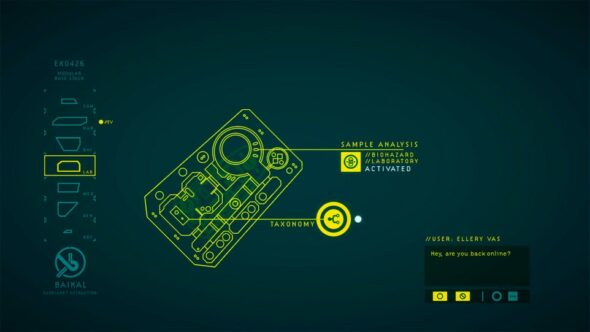
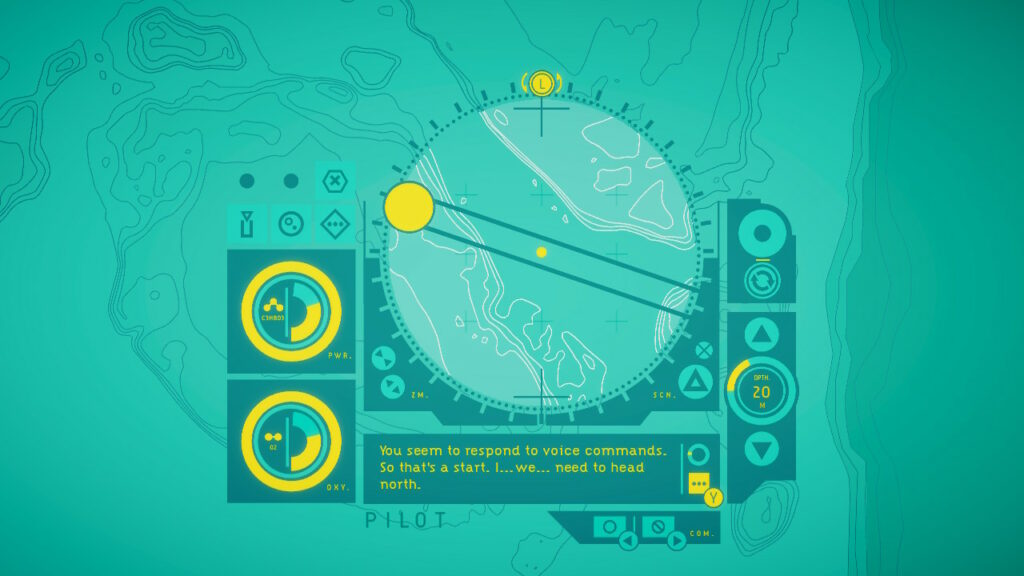
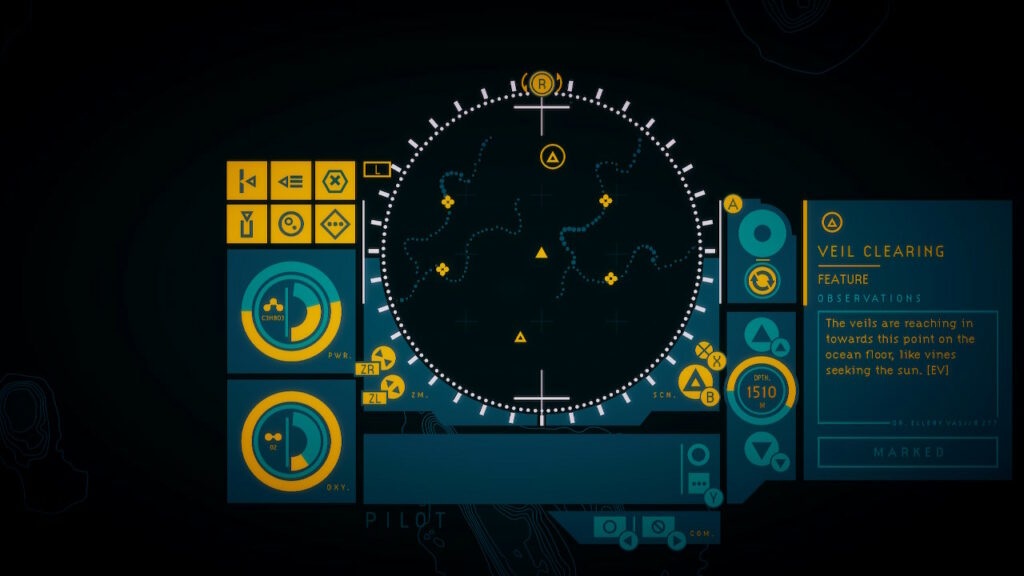

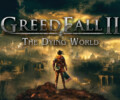


No Comments